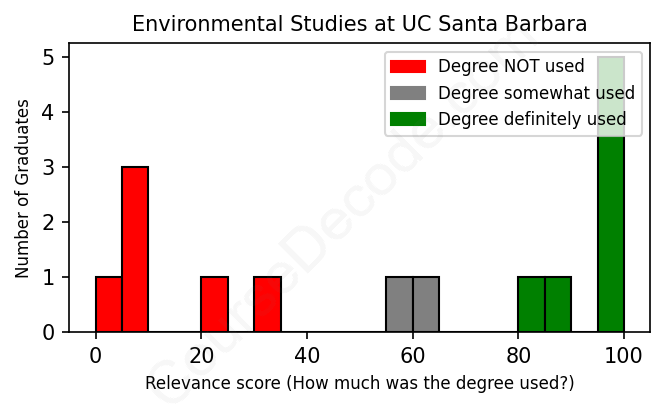
First, some facts. Of the Environmental Studies graduates from UC Santa Barbara we've analyzed , here's how many have used (or NOT used) their degree in their career:

These are estimates based on AI analysis of 15 LinkedIn profiles (see below).
The verdict? Below average. Overall, with an average relevance score of 57%, Environmental Studies graduates from UC Santa Barbara have a lower likelihood (-10%) of finding work in this field compared to the average graduate across all fields:
And for comparison, here's the chart for all profiles we've looked at across all degrees.
Also, after graduating, only 20% of these graduates have pursued further education other than another Bachelor's degree (such as a Masters degree or other), compared to the average across all profiles of 35%. This suggests a Bachelors degree is enough for most Environmental Studies graduates, and it's normal to look for work straight after graduation.
See the details:
|
Relevance score: 8% We think this person has NOT gone into a career related to their degree. We think this person has NOT gone into a career related to their degree.
DEGREE INFOGraduated in 2019 from UC Santa Barbara with a Bachelor's degree in Environmental Studies. No other secondary education since. JOB HISTORY SINCE GRADUATIONLead Receptionist Kearny Mesa Veterinary Center Aug 2019 - Apr 2020 Project Intern  SEAL Awards May 2021 - Sep 2021 Server  Red Tracton's Steakhouse Jul 2021 - Present ABOUTMotivated individual with interest in environmental consulting and project management seeking an opportunity to engage with both the general public and potential clients. As a dedicated student in both academic and non-academic settings, I am a fast learner driven by the desire to analyze a project or clients needs and streamline their success. My strong interpersonal communication skills, combined with my hospitality mindset ensure that I can deliver exceptional service to clients and stakeholders. Additionally, my experience in customer service and environmental education allows me to bond with and effectively engage with others about topics they may be unfamiliar with. I am passionate about actively bridging the gap between the scientific community and the general public while encouraging corporate environmental advocacy and reducing eco-footprints in a variety of different industries! |
The top 10 most common jobs done by the graduates we've analyzed (ranked most common to least) are:
When looking at the jobs that people with an Environmental Studies degree from UC Santa Barbara have taken on, it seems there's a pretty good mix of roles. Many grads have landed positions that are directly related to environmental science and policy, like Environmental Compliance Specialists, Marine Biologists, and Environmental Scientists. These roles usually involve applying the ecological knowledge they gained during their studies, dealing with things like sustainability and regulatory compliance. However, not everyone has taken that straight path. There are also folks who ended up in totally different fields—like teaching English or working as retail managers—where their degree doesn’t really come into play at all.
Overall, it looks like a significant number of these grads are doing work that connects pretty closely to Environmental Studies, especially those in roles involving research or compliance. However, there’s a noticeable chunk who are in jobs that don’t require that expertise. So, if you're considering this degree, it’s good to know that while it can lead you toward a solid career in environmental fields, you might still find yourself in unrelated jobs if that’s what comes up after graduation. It really shows how flexible the degree can be, but it also highlights the need to stay focused on your passion if you want to stick with environmental issues in your career!
Here is a visual representation of the most common words in job titles for Environmental Studies graduates (this is across all Environmental Studies graduates we've analyzed, not just those who went to UC Santa Barbara):

From what I see in the LinkedIn profiles of UC Santa Barbara Environmental Studies graduates, there's a pretty mixed bag of career trajectories. Right out of college, many of them land positions that are at least somewhat related to environmental work, like being an Environmental Compliance Specialist, Biologist, or working in solar energy sales. This suggests that the degree does provide a solid foundation for entering the environmental field. However, there are also a fair number who veer off into unrelated roles, like teaching English in Japan or working retail, especially in the earlier years after graduation. That might hint at either a saturated job market or graduates not landing their ideal roles immediately.
As time goes on, it looks like some of these graduates find their way back into more relevant positions. Many of the profiles from around the five to ten-year mark show people advancing in their environmental careers, moving into roles like Environmental Scientist, Project Manager, or even higher executive sorts of jobs like Vice President at a waste management company. This indicates that while the first job after graduation may sometimes be a bit of a stumble, many eventually find their niche in the environmental sector and, over the years, grow into more substantial and impactful roles. So, while there’s some initial wandering off the path, a good number of these grads do end up where their degree would hope to lead them, which is encouraging for anyone considering a similar path.
A Bachelor’s degree in Environmental Studies at UC Santa Barbara can be pretty challenging, but it really depends on how much you’re into the subject. The program combines science, policy, and social aspects of the environment, so you’ll need to deal with a mix of biology, chemistry, and some social sciences, which can get intense. Plus, you’ll probably have assignments that require a lot of research and critical thinking. But if you're passionate about the environment and enjoy hands-on projects or fieldwork, it can also be super rewarding. Overall, it's not the easiest degree out there, but it’s manageable if you stay organized and genuinely care about the topics you're studying.
Most commonly, in the LinkedIn profiles we've looked at, it takes people 4 years to finish a Bachelor degree in Environmental Studies.
Looking at these UC Santa Barbara Environmental Studies graduates, it seems like some of them are doing pretty well, while others might be still figuring things out. For instance, those who moved into roles like Operations Manager and Vice President at Belshire Environmental Services likely have decent salaries, reflecting their climb up the career ladder. Meanwhile, folks in entry-level positions or more volunteer-based roles, like the Crew Member at Trader Joe's or the News Intern, might not be making much yet. It seems the degree can lead to good opportunities, but how quickly you get to that higher earning potential really depends on the specific path you take and the roles you land in right after graduation. So, it’s a mixed bag: some are raking it in, and others are grinding it out!
Here is a visual representation of the most common words seen in the "about" section of LinkedIn profiles who have a Bachelor degree in Environmental Studies (this is across all Environmental Studies graduates we've analyzed, not just those who went to UC Santa Barbara). This may or may not be useful:

Here are all colleges offering a Bachelor degree in Environmental Studies (ordered by the average relevance score of their Environmental Studies graduates, best to worst) where we have analyzed at least 10 of their graduates:
| College | Score | Count |
|---|---|---|
 California State University-Sacramento California State University-Sacramento
|
89 | 10 |
 University of Vermont University of Vermont
|
72 | 21 |
 University of California, Santa Barbara University of California, Santa Barbara
|
69 | 24 |
 University of California, Santa Cruz University of California, Santa Cruz
|
59 | 31 |
 Florida State University Florida State University
|
57 | 10 |
 University of Washington University of Washington
|
57 | 13 |
 UC Santa Barbara UC Santa Barbara
|
57 | 15 |
 University of Oregon University of Oregon
|
56 | 13 |
 University of Colorado Boulder University of Colorado Boulder
|
53 | 24 |